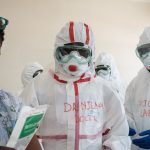COVID-19 is on the rise in Kenya, where there have been approximately 12,000 confirmed cases of the disease and 217 deaths. Dr. Angeline Ithondeka is the medical superintendant of Naivasha County Referral Hospital in Nakuru, Kenya, northwest of Nairobi, which is a longtime partner of Physicians for Human Rights. Though Nakuru County has had relatively few cases so far, Dr. Ithondeka warns that stigma, against both COVID-19 patients and the health workers caring for them, can be a challenge in halting the spread of the disease.
PHR: How would you describe the COVID-19 preparations and response in Kenya and, more specifically, in Nakuru County?
Dr. Ithondeka: At the hospital level, the two major hospitals in Nakuru County are well prepared when it comes to the set-up of treatment centers and patient management. At the preventive level, there still needs to be more effort in public awareness and behavior change. Testing is also not happening very well because of the nationwide challenges in accessing reagents. However, Naivasha and Nakuru are participating in targeted testing, with Naivasha testing truck drivers and Nakuru testing food handlers and health workers.
Quarantine facilities are experiencing challenges because of the cost, since patients are no longer being billed if they are quarantined as a result of public health guidance. But these centers have a lot of costs and it is unclear on how they will be covered. There is also a lot of stigma surrounding these centers and those working in these centers.
PHR: There are reports of shortages of personal protective equipment (PPE) all over the world, affecting the ability of health care workers to provide care safely. Has this been a cause of concern for you and your team?
Dr. Ithondeka: PPE is definitely a concern. The consumption of PPE at all levels has gone up. For example, we use 350 – 400 surgical face masks every day. In the early stages of the outbreak in Kenya, there were no coveralls countrywide for about a month. Our county is currently providing them for us. N95 masks are also expensive, not reusable, and in short supply. However, we have found a way to make face-shields locally, so these are easily accessible.
PHR: Have health workers across the county been adequately trained to address COVID-19 and the use of related equipment?
Dr. Ithondeka: Naivasha has done a good job with training. Initially, I stayed updated on the progression of the disease and gave weekly 10-minute talks to inform staff on the rapid changes. When the disease was declared a pandemic, these turned into full hour-long sessions where we would develop hypothetical plans about what our response as a hospital would be if we received a COVID-19 patient.
So far, we have trained approximately 250 (out of 400) of our staff from the hospital. The same hospital training team has been called upon to train the regional prison wardens in the south rift, about nine prisons.
PHR: When it comes to the spread of the virus and the impact on health workers, what is the worst-case scenario, in your opinion? And the best-case scenario?
Dr. Ithondeka: Worst case scenario: having health professionals infected and it ends up being fatal or they end up with chronic complications. It would be devastating to the health sector to have a significant population of health professionals affected.
Best case: the disease is contained well enough and we don’t have many health professionals testing positive for coronavirus. That they remain motivated, supported, and have minimal trauma/distress/negative psychosocial effects.
PHR: Many health care workers are being stigmatized for working on COVID-19. Are you seeing this in Naivasha?
Dr. Ithondeka: Stigma is alive! Look at COVID 19 patients who have died at home, this is as a result of stigma! They are afraid of being identified by the community or even going to quarantine centers.
This was [also] a major problem [among hospital staff] in the beginning. During the training at the hospital, not everyone was willing to be among the first to be trained. They believed that training will mean that they will be the first to be called to assist with coronavirus positive patients. Very few wanted to work in the isolation center as well. Some departments would discriminate against them for fear of infection.
Another health professional from a different hospital mentioned that since she started working in the isolation ward, her colleagues have shunned her. She no longer eats or sits with them, and if she comes next to them, they keep their distance, wear their masks, and start aggressively sanitizing – passing the message that she is a danger to them.
We have spoken to the staff, addressing this behavior, and there has been some improvement.
PHR: How are you coping personally? What has been your source of strength during this challenging period, what keeps you moving?
Dr. Ithondeka: It has been very tiring and stressful. I have been experiencing both physical and mental fatigue. I have a lot of things to deal with, managing the hospital, staff, expenses, and dealing with the pandemic. I would like to visit my family, but I can’t.
I am coping well, but it has not been easy. I have tried to be strict with my work hours so that I do not make a habit of working after hours.
Photo: Staff at Kenyatta National Hospital in Nairobi, Kenya don protective equipment before visiting patients in March 2020. Yasoyoshi Chiba/AFP/Getty Images.

